Unit 14 知识点
英语第十四单元知识点

英语第十四单元知识点英语第十四单元知识点:本文将介绍英语第十四单元的重点知识,内容涵盖语法、词汇和阅读理解等方面。
希望通过本文的阐述,能够帮助读者更好地掌握这些知识点,提高英语水平。
一、语法知识点1. 直接引语和间接引语:直接引语是原样引用别人的话,需要使用引号;间接引语是对别人说的话进行转述,不使用引号,且需要根据句子结构和时态等进行相应的转变。
2. 动词时态和语态:英语中有多种动词时态和语态的形式,需要根据上下文和句意来选择适当的时态和语态。
3. 条件句:条件句用于表达假设、推理或虚拟情况,主要分为三种类型:零条件句、一般条件句和虚拟条件句。
每种类型都有各自的语法结构和用法。
4. 定语从句:定语从句用于修饰某个名词或代词,一般由关系代词或关系副词引导,并且在从句中充当句子的一部分。
5. 状语从句:状语从句用于表示时间、条件、原因、结果等,一般由连词引导,并且在从句中充当状语的作用。
二、词汇知识点1. 同义词和反义词:同义词是指意义相近或相同的词语,可以用来增加语言表达的多样性;反义词是指意义相反的词语,可以用来进行对比和强调。
2. 词性转换:有些词语可以通过改变词缀或词性进行转换,从而表达不同的含义或用法。
比如,名词可以转换为动词或形容词,动词可以转换为名词等。
3. 词组和短语:词组是由两个或多个单词组成的固定搭配,具有固定的意义和用法;短语是由几个单词组成的固定组合,但其意义可根据上下文进行调整。
三、阅读理解知识点1. 主旨概括:阅读理解中要求读者从段落或全文中找出主旨或概括文章的中心思想,并进行准确的归纳总结。
2. 推理判断:阅读理解中会涉及到作者的暗示和信息的推理,要求读者根据细节、上下文等进行推理和判断,得出正确的答案。
3. 细节理解:阅读理解中会涉及到一些具体的细节信息,要求读者通过仔细阅读文字,找出相关的细节来回答问题。
4. 文章结构:阅读理解中的文章往往有一定的结构和组织,读者需要通过观察段落的开头和结尾,以及段落之间的逻辑关系来理解文章的结构。
九年级英语上册unit14知识要点

九年级英语上册Unit14 I remember meeting all of you in Grade 7.一、课文要点:1、◆remember的此种用法也适用于forget句型I’ll never forget waiting for you in the rain for the whole night.我永远不会忘记在雨中等了你整整一个晚上。
He often forgets to close the door.他经常忘记关门。
2、doing a school survey.做学校调查survey作可数名词,意为“调查;测量”,复数形式为surveys 。
The results of the survey made fascinating reading. 调查结果令人读起来饶有兴味。
The survey has a margin of error of 2.5%.测量的误差幅度为2.5%。
The current survey will have a wider geographical spread.当前的调查将在更广泛的地域范围内进行。
3、At junior high school, I remember a friend helping me with a problem.在中学时,我记得一个朋友曾经帮助我解决问题。
help sb. with sth.“帮助某人做某事”Lucy often helps her mother with housework on Sunday.露西在星期天经常帮助妈妈做家务。
◆help 构成的短语:help oneself (to)“随便吃”can’t help doing sth“禁不住做某事”with the help of“在……的帮助下”Children,help yourselves to some fruits.孩子们,请随便吃些水果吧。
I couldn’t help crying.我忍不住哭了。
Unit14-知识点归纳-2021-2022学年九年级英语人教版全册
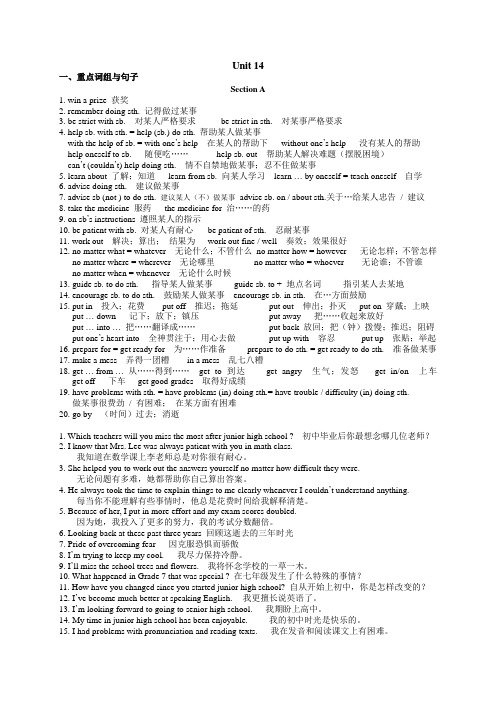
U n i t14一、重点词组与句子Section A1. win a prize 获奖2. remember doing sth. 记得做过某事3. be strict with sb. 对某人严格要求be strict in sth. 对某事严格要求4. help sb. with sth. = help (sb.) do sth. 帮助某人做某事with the help of sb. = with one’s help 在某人的帮助下without one’s help 没有某人的帮助help oneself to sb. 随便吃……help sb. out 帮助某人解决难题(摆脱困境)can’t (couldn’t) help doing sth. 情不自禁地做某事;忍不住做某事5. learn about 了解;知道learn from sb. 向某人学习learn … by oneself = teach oneself 自学6. advise doing sth. 建议做某事7. advise sb (not ) to do sth. 建议某人(不)做某事advise sb. on / about sth.关于…给某人忠告/ 建议8. take the medicine 服药the medicine for 治……的药9. on sb’s instructions 遵照某人的指示10. be patient with sb. 对某人有耐心be patient of sth. 忍耐某事11. work out 解决;算出;结果为work out fine / well 奏效;效果很好12. no matter what = whatever 无论什么;不管什么no matter how = however 无论怎样;不管怎样no matter where = wherever 无论哪里no matter who = whoever 无论谁;不管谁no matter when = whenever 无论什么时候13. guide sb. to do sth. 指导某人做某事guide sb. to + 地点名词指引某人去某地14. encourage sb. to do sth. 鼓励某人做某事encourage sb. in sth. 在…方面鼓励15. put in 投入;花费put off 推迟;拖延put out 伸出;扑灭put on 穿戴;上映put … down 记下;放下;镇压put away 把……收起来放好put … into …把……翻译成……put back 放回;把(钟)拨慢;推迟;阻碍put one’s heart into 全神贯注于;用心去做put up with 容忍put up 张贴;举起16. prepare for = get ready for 为……作准备prepare to do sth. = get ready to do sth. 准备做某事17. make a mess 弄得一团糟in a mess 乱七八糟18. get … from …从……得到……get to 到达get angry 生气;发怒get in/on 上车get off 下车get good grades 取得好成绩19. have problems with sth. = have problems (in) doing sth.= have trouble / difficulty (in) doing sth.做某事很费劲/ 有困难;在某方面有困难20. go by (时间)过去;消逝1. Which teachers will you miss the most after junior high school ? 初中毕业后你最想念哪几位老师?2. I know that Mrs. Lee was always patient with you in math class.我知道在数学课上李老师总是对你很有耐心。
Unit14Chocolateheaven!知识点(讲义)新概念英语青少版2A

Unit 14 Chocolate heaven! 巧克力天堂!一、重点单词及拓展:1. share 动词,分享;分担短语:share...with...与...分享例:I have many storybooks, I can share them with you.我有很多故事书,我可以和你一起分享。
Can you share your feeling with me?你能和我分享一下你的感受吗?2.contain 动词,包含;容纳例:This chocolate contains 50% cocoa. 这种巧克力包含50%的可可粉。
The bag contained a Christmas card. 这个包里装着一张圣诞卡。
container 名词,集装箱;容器造句练习1:1)你应该和我们一起分享这些食物。
2)这本书包含5个短故事。
3.else 可做形容词和副词,意思是“别的”“其它的”1)放在疑问词who, what, where等的后面,作后置定语。
例:Who else can you see?你还能看见别的什么人?Where else do you want to go?你想去别的什么地方吗?2)放在复合不定代词的后面。
例:Is there anything else in your bag?你的包里还有别的什么东西吗?Does anyone else know about it?还有别的什么人知道这件事吗?专项练习1:what else________________ when else_____________________something else_________________somebody else______________ nothing else_______________4.not...at all 一点也不,根本不(比一般的否定句否定程度更深)注意:not 不能单独使用,要用在助动词/系动词/情态动词的后面。
九年级英语Unit14知识点

Unit 14 I remember meeting all of you in Grade 7.一、重点词组1.win a prize2.do a school survey 做一个学校3.meet the standard of a strict teacher达到一位要求格的老的要求4. meet this group of friends遇到群朋友5. score two goals in a row踢两个球6. learn to play the keyboard学会琴7. be patient with sb⋯有耐心8. work out the answer yourself自己找出答案9. guide sb to do sth 指某人做某事10. put in more effort更加努力11. look back at 回首12. pride of overcoming fear战胜恐惧感的骄傲13.make a great big mess 弄得一糟14.keep my cool 保持我的傲慢15. try to be on time for morning reading全力追上早16. look forward to doing sth希望做某事17. join the school swim team加入学校游泳18.get a business d egree 获取一个商学位19.became manager 成理20.believe in sb 相信某人21. attend the graduation ceremony出席典22. First of all第一23. full of energy充活力24. thirsty of knowl edge 渴求知25. hope for the future未来的希望26. never fail to be thankful to sb必然要向某人表达感谢27. the beginning of a new life一个再生活的开始28.ahead of sb 在某人前面29.be responsibl e for your d ecision action自己的决定和行30.go your separate ways 走自己的路31. set out on your new journey开始你的新旅途32.separate from sb 与⋯分33.give wings to fly某人翔的翅膀34. The last day of junior high school高中最后一天35.scared and nervous害怕和36.the last day of junior high school在中学的最后一天37.share so many good memories分享如些多美好的二、重点句式1.What happened in Grade 7 that was special?在七年什么了什么特的事?Our team won the school basketball competition.我了学校的球比。
人教版英语九年级unit 14知识点

人教版英语九年级unit 14知识点Unit 14 Knowledge PointsIn this unit, we will explore various knowledge points covered in the ninth grade English textbook published by People's Education Press (人教版). Here, we will delve into the key concepts and ideas introduced in Unit 14. It is important to note that the format of this article will not strictly follow the textbook's layout, but it aims to effectively communicate the knowledge points in a clear and organized manner.1. Understanding CultureUnit 14 of the ninth-grade English textbook focuses on the theme of "Culture." It aims to broaden students' understanding of different cultures and promote intercultural communication. The unit covers topics such as traditional festivals, cultural exchanges, and customs from around the world.2. Vocabulary and GrammarUnit 14 also introduces new vocabulary words and grammar structures to enhance students' language proficiency. Some of the key vocabulary words include "custom," "tradition," "symbol," and "belief." These words are essential for students to comprehend the cultural concepts discussed in the unit.In terms of grammar, students will learn about the passive voice, comparatives and superlatives, and reported speech. Understanding these grammar points is crucial for students to express their ideas accurately and effectively.3. Reading ComprehensionUnit 14 provides several reading passages that aim to improve students' reading comprehension skills. These passages are designed to expose students to a variety of cultural topics, such as Chinese New Year, Thanksgiving, and the Olympic Games.Through reading and analyzing these texts, students can gain a deeper understanding of different cultures and traditions. Additionally, comprehension exercises are provided to test students' understanding of the passages and reinforce their reading skills.4. Listening and SpeakingUnit 14 places great emphasis on listening and speaking skills. Listening exercises are included to help students develop their ability to understand spoken English in various contexts. These exercises feature dialogues, interviews, and speeches related to cultural topics.To enhance speaking skills, students engage in communicative activities where they discuss their own cultures, share experiences, and give presentations on different customs. This allows students to practice expressing themselves and communicating their ideas fluently in English.5. Writing PracticeUnit 14 also provides opportunities for students to improve their writing skills by focusing on descriptive and informative texts. Students are guided to write about a cultural festival, compare traditions, or share their cultural experiences.Writing tasks in this unit promote creativity, critical thinking, and language development. By engaging in these activities, students canreinforce their writing abilities and deepen their understanding of cultural diversity.ConclusionUnit 14 of the ninth-grade English textbook published by People's Education Press offers a comprehensive exploration of various knowledge points related to culture. Through vocabulary and grammar exercises, reading comprehension activities, listening and speaking tasks, and writing practice, students can broaden their horizons and enhance their language skills.This unit serves as a platform for students to appreciate the richness of different cultures and embrace diversity. By engaging with the content in Unit 14, students can develop a global perspective and become competent communicators in the English language.。
九年级unit14 知识点
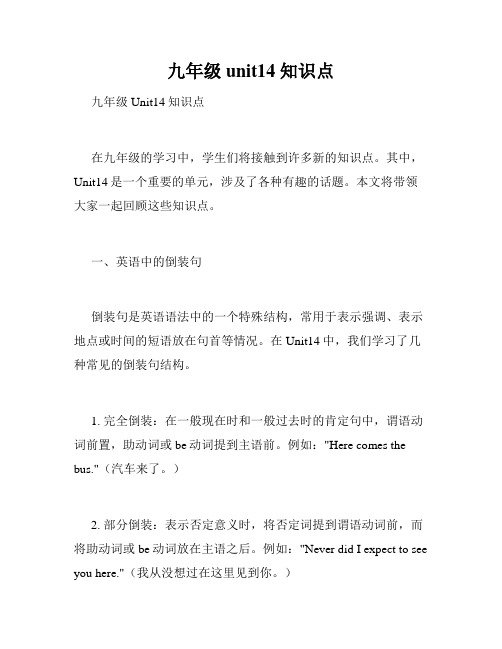
九年级unit14 知识点九年级Unit14知识点在九年级的学习中,学生们将接触到许多新的知识点。
其中,Unit14是一个重要的单元,涉及了各种有趣的话题。
本文将带领大家一起回顾这些知识点。
一、英语中的倒装句倒装句是英语语法中的一个特殊结构,常用于表示强调、表示地点或时间的短语放在句首等情况。
在Unit14中,我们学习了几种常见的倒装句结构。
1. 完全倒装:在一般现在时和一般过去时的肯定句中,谓语动词前置,助动词或be动词提到主语前。
例如:"Here comes the bus."(汽车来了。
)2. 部分倒装:表示否定意义时,将否定词提到谓语动词前,而将助动词或be动词放在主语之后。
例如:"Never did I expect to see you here."(我从没想过在这里见到你。
)了解和掌握这些倒装句的结构和用法,能够帮助我们更准确地表达自己的意思。
二、动词不定式的用法动词不定式在英语中有许多不同的用法。
在Unit14中,我们学习了其中的两种用法。
1. 作主语:不定式可以作为句子的主语,通常用于表示具体的行为或做某事的能力等。
例如:"To play basketball is my favorite hobby."(打篮球是我的最爱。
)2. 作宾语:动词不定式可以作为及物动词的宾语,常跟随某些动词一起使用,如hope, want, need等。
例如:"I want to go to the movies tonight."(我想今晚去看电影。
)掌握这些不同的动词不定式的用法,可以帮助我们更好地运用英语,使我们的表达更加准确和地道。
三、情态动词的用法情态动词是一种特殊的动词形式,用于表示说话者对某种行为、状态或可能性的态度、推测、能力等。
在Unit14中,我们学习了几种常见情态动词的用法。
1. Can: 表示能力、许可或请求。
英语第十四单元知识点
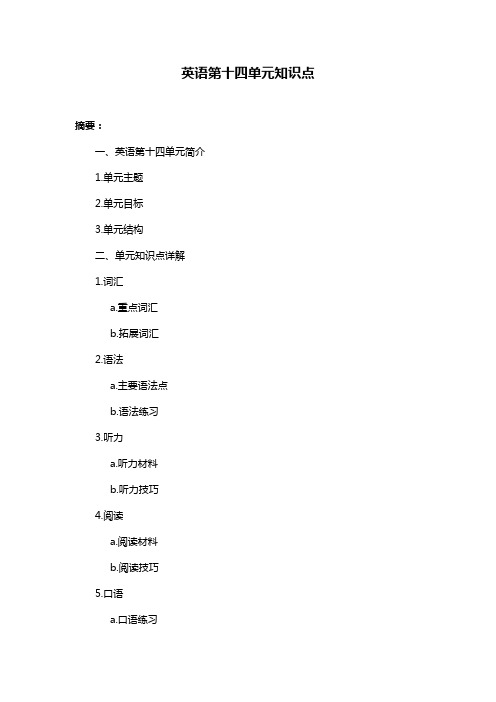
英语第十四单元知识点摘要:一、英语第十四单元简介1.单元主题2.单元目标3.单元结构二、单元知识点详解1.词汇a.重点词汇b.拓展词汇2.语法a.主要语法点b.语法练习3.听力a.听力材料b.听力技巧4.阅读a.阅读材料b.阅读技巧5.口语a.口语练习b.口语技巧6.写作a.写作任务b.写作技巧三、学习建议与策略1.学习方法2.时间规划3.自我检测正文:英语第十四单元是英语学习中的一个重要单元,它以生活场景为背景,帮助学生掌握一系列实用的英语知识。
本单元的主题是“购物”,旨在让学生学会在日常生活中进行购物交流。
一、英语第十四单元简介本单元的主题为“购物”,涵盖了购物过程中的各种场景和交流方式。
通过本单元的学习,学生将掌握购物相关的词汇、语法、听力、阅读、口语和写作技巧,从而提高自己的英语应用能力。
二、单元知识点详解1.词汇本单元的重点词汇包括购物常用词汇,如:price(价格)、size(尺寸)、color(颜色)、style(款式)等。
拓展词汇包括购物场景中的其他常用词汇,如:clothing(衣物)、shoes(鞋子)、accessories(配饰)等。
2.语法本单元的主要语法点包括一般现在时、一般过去时和一般将来时。
语法练习通过购物场景的对话,让学生在实际语境中运用所学语法知识。
3.听力听力材料主要包括购物场景的对话,让学生熟悉购物过程中的各种交流方式。
听力技巧包括捕捉关键信息、理解对话背景等。
4.阅读阅读材料包括购物场景的短文和广告,让学生通过阅读理解购物过程中的信息交流。
阅读技巧包括寻找主题句、理解事实细节等。
5.口语口语练习包括角色扮演、情景对话等,让学生在实际语境中运用所学英语知识进行购物交流。
口语技巧包括正确使用语法、清晰表达观点等。
6.写作写作任务包括写一篇购物清单、给朋友推荐商品等。
写作技巧包括正确使用词汇、组织结构清晰等。
三、学习建议与策略1.学习方法:结合生活实际,通过模仿、实践、反思等方式,提高英语应用能力。
英语总复习:unit14《festivals》(大纲版第一册).doc

英语总复习:Unit14《Festivals》(大纲版第一册)I.单元知识点全览工欲善其事必先利其器高考须掌握的词汇:1.argue 2.majority 3.probable 4.honourable 5.national 6.create 7.faithful 8.commerce 9.simila rly1o.salutation 11.celebrate 12.respectful/respectable 13.foolish 14.inwte高考须掌握的短语:1.up 2.in 3.on 4.inⅡ.考点过关过关斩将一马平川考点详解精剖细解入巿三分一、重点词汇1.symbol n.象征;符号;记号eg:In this picture the tree is the symbol of Iife and the snake is the symbol of evll.这幅画中树是生命的象征,蛇是邪恶的象征。
相关链接:syrflbolic adj.象征(性)的;用符号表示的symbolism n.象征主义symbolist n.象征派作家或艺术家。
用法拓展;the symbol of………的象征the symbol f0 r…代表……的符号案例剖析旁征博引举一反三考题1 (典型例题he lion is consid-ered the king of the forest as it is a(n) of courage and power.A.example B.signC. mark D. symbol考题1点拨:答案为D。
example例子;sign招牌,征兆,迹象!mark痕迹,记号;symbol象征。
句意为:“狮子被认为是森林之王,因为它是勇气和力量的象征。
2.0pinion n.意见;看法eg:一His opinions are usually based on facts.他的看法通常有事实根据。
九年级unit14单元知识点

九年级unit14单元知识点九年级Unit 14单元知识点Unit 14是九年级英语教材中的一个重要单元,主要讲解了有关交通与旅行的话题,涉及到了词汇、语法、听力、口语和写作等方面的知识点。
下面将详细介绍本单元的主要知识点,以帮助同学们更好地学习和掌握这部分内容。
一、词汇本单元的词汇主要包括以下几个方面:交通工具、交通信号、旅行和方向。
1. 交通工具(Means of Transportation)- car(汽车)- bus(公交车)- bike(自行车)- subway(地铁)- train(火车)- plane(飞机)- ship(船)2. 交通信号(Traffic Signs)- traffic light(红绿灯)- stop sign(停车标志)- yield sign(让行标志)- pedestrian crossing(人行横道)- speed limit(限速标志)3. 旅行(Travel)- trip(旅行)- journey(旅程)- tourist(游客)- passport(护照)- luggage(行李)- ticket(车票/机票)4. 方向(Directions)- north(北)- south(南)- east(东)- west(西)- turn left(左转)- turn right(右转)- go straight(直走)二、语法本单元的语法部分主要涉及到情态动词的用法和一般现在时的被动语态。
1. 情态动词(Modal Verbs)- must(必须)- can(能够)- may(可能)- should(应该)- might(可能)2. 一般现在时的被动语态(Passive Voice in Simple Present)- 主语 + am/is/are(be动词的相应形式)+ 过去分词三、听力与口语通过听力和口语练习,同学们可以提高他们的听力理解和口语表达能力,使他们更好地运用所学知识。
英语第十四单元知识点(一)
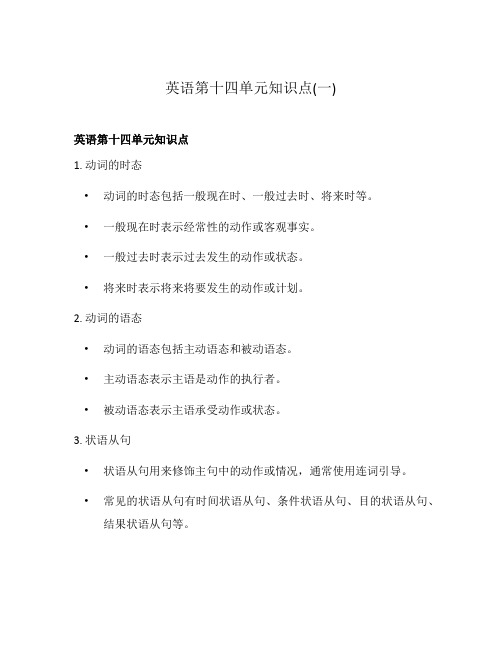
英语第十四单元知识点(一)英语第十四单元知识点1. 动词的时态•动词的时态包括一般现在时、一般过去时、将来时等。
•一般现在时表示经常性的动作或客观事实。
•一般过去时表示过去发生的动作或状态。
•将来时表示将来将要发生的动作或计划。
2. 动词的语态•动词的语态包括主动语态和被动语态。
•主动语态表示主语是动作的执行者。
•被动语态表示主语承受动作或状态。
3. 状语从句•状语从句用来修饰主句中的动作或情况,通常使用连词引导。
•常见的状语从句有时间状语从句、条件状语从句、目的状语从句、结果状语从句等。
4. 形容词和副词的比较级和最高级•形容词和副词的比较级表示比较程度。
•比较级的构成规则是在词尾加上-er或者在词前加上more,如”taller”或”more beautiful”。
•最高级的构成规则是在词尾加上-est或者在词前加上most,如”tallest”或”most beautiful”。
5. 名词所有格•名词所有格用来表示所属关系。
•在普通名词后加上’s构成所有格,如”John’s book”。
•在复数名词或以s结尾的名词后只需加上’构成所有格,如”students’ books”。
6. 数词和序数词•数词用来表示数量或顺序。
•序数词用来表示顺序或位置。
7. 名词性从句•名词性从句用来充当主语、宾语或表语等。
•常见的名词性从句有主语从句、宾语从句和表语从句等。
8. 定语从句•定语从句用来修饰名词或代词。
•定语从句通常以关系代词或关系副词引导。
以上是英语第十四单元的知识点,掌握这些知识将有助于提高你的英语水平。
继续努力学习,加油!。
英语第十四单元知识点
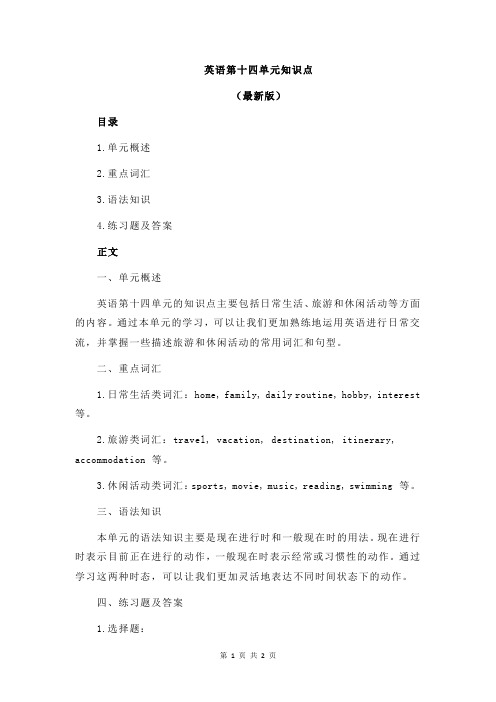
英语第十四单元知识点(最新版)目录1.单元概述2.重点词汇3.语法知识4.练习题及答案正文一、单元概述英语第十四单元的知识点主要包括日常生活、旅游和休闲活动等方面的内容。
通过本单元的学习,可以让我们更加熟练地运用英语进行日常交流,并掌握一些描述旅游和休闲活动的常用词汇和句型。
二、重点词汇1.日常生活类词汇:home, family, daily routine, hobby, interest 等。
2.旅游类词汇:travel, vacation, destination, itinerary, accommodation 等。
3.休闲活动类词汇:sports, movie, music, reading, swimming 等。
三、语法知识本单元的语法知识主要是现在进行时和一般现在时的用法。
现在进行时表示目前正在进行的动作,一般现在时表示经常或习惯性的动作。
通过学习这两种时态,可以让我们更加灵活地表达不同时间状态下的动作。
四、练习题及答案1.选择题:(1) I _______ (watch) a movie every Saturday.A.am watchingB.watchC.am watchingD.watches答案:B(2) They _______ (be) in the park now.A.isB.areC.amD.is答案:B2.填空题:(1) I usually _______ (go) to the gym after work.(2) They _______ (travel) to Japan next month.答案:(1) go (2) travel通过以上练习题,我们可以更好地巩固本单元所学的知识点,并提高自己的英语运用能力。
新目标英语九年级Unit14知识点
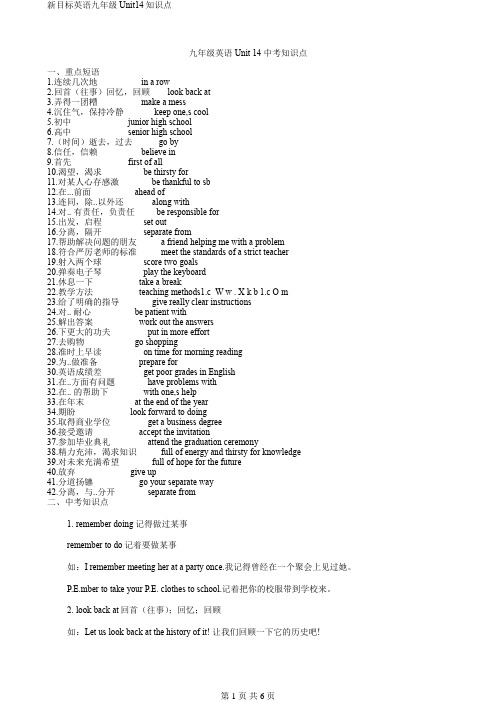
九年级英语Unit 14 中考知识点一、重点短语1.连续几次地 in a row2.回首(往事)回忆,回顾 look back at3.弄得一团糟 make a mess4.沉住气,保持冷静 keep one,s cool5.初中 junior high school6.高中 senior high school7.(时间)逝去,过去 go by8.信任,信赖 believe in9.首先 first of all10.渴望,渴求 be thirsty for11.对某人心存感激 be thankful to sb12.在...前面 ahead of13.连同,除..以外还 along with14.对.. 有责任,负责任 be responsible for15.出发,启程 set out16.分离,隔开 separate from17.帮助解决问题的朋友 a friend helping me with a problem18.符合严厉老师的标准 meet the standards of a strict teacher19.射入两个球 score two goals20.弹奏电子琴 play the keyboard21.休息一下 take a break22.教学方法 teaching methods1.c W w . X k b 1.c O m23.给了明确的指导 give really clear instructions24.对.. 耐心 be patient with25.解出答案 work out the answers26.下更大的功夫 put in more effort27.去购物 go shopping28.准时上早读 on time for morning reading29.为..做准备 prepare for30.英语成绩差 get poor grades in English31.在..方面有问题 have problems with32.在.. 的帮助下 with one,s help33.在年末 at the end of the year34.期盼 look forward to doing35.取得商业学位 get a business degree36.接受邀请 accept the invitation37.参加毕业典礼 attend the graduation ceremony38.精力充沛,渴求知识 full of energy and thirsty for knowledge39.对未来充满希望 full of hope for the future40.放弃 give up41.分道扬镳 go your separate way42.分离,与..分开 separate from二、中考知识点1. remember doing记得做过某事remember to do记着要做某事如:I remember meeting her at a party once.我记得曾经在一个聚会上见过她。
英语第十四单元知识点
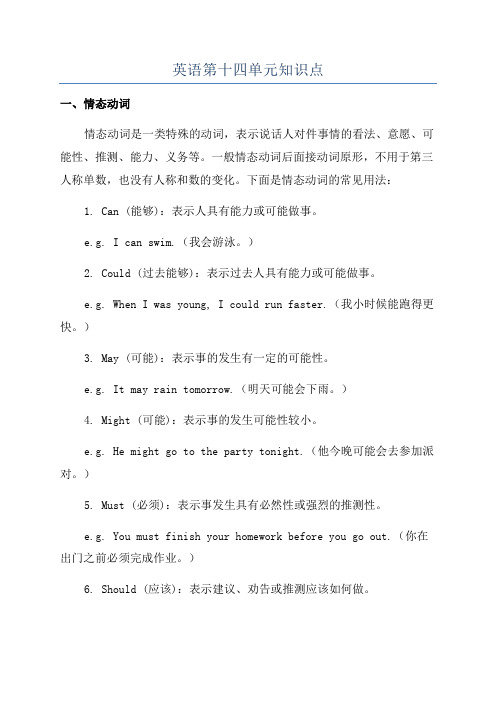
英语第十四单元知识点一、情态动词情态动词是一类特殊的动词,表示说话人对件事情的看法、意愿、可能性、推测、能力、义务等。
一般情态动词后面接动词原形,不用于第三人称单数,也没有人称和数的变化。
下面是情态动词的常见用法:1. Can (能够):表示人具有能力或可能做事。
e.g. I can swim.(我会游泳。
)2. Could (过去能够):表示过去人具有能力或可能做事。
e.g. When I was young, I could run faster.(我小时候能跑得更快。
)3. May (可能):表示事的发生有一定的可能性。
e.g. It may rain tomorrow.(明天可能会下雨。
)4. Might (可能):表示事的发生可能性较小。
e.g. He might go to the party tonight.(他今晚可能会去参加派对。
)5. Must (必须):表示事发生具有必然性或强烈的推测性。
e.g. You must finish your homework before you go out.(你在出门之前必须完成作业。
)6. Should (应该):表示建议、劝告或推测应该如何做。
e.g. You should study hard for the exam.(你应该努力学习备考。
)7. Ought to (应该):与should意思相同,但语气更强烈。
e.g. You ought to apologize to your friend for what you did.(你应该因为你的所作所为向你的朋友道歉。
)二、被动语态被动语态是英语动词的一种形式,代表主动语态中的动作是由动作的对象承受或遭受的。
构成被动语态时,需要使用be动词,后跟过去分词形式的动词。
常见的be动词有am、is、are、was、were等。
下面是被动语态的构成和用法:1.构成被动语态的一般过程:主动语态:Subject + Verb + Object被动语态:Object + be verb + 过去分词 + by + Subject2.被动语态的用途:a.不知道或没有必要知道动作的执行者。
unit14知识点
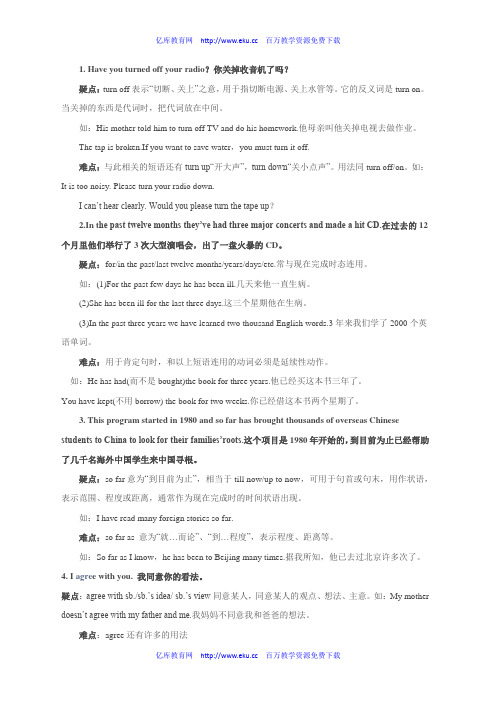
1. Have you turned off your radio?你关掉收音机了吗?疑点:turn off表示“切断、关上”之意,用于指切断电源、关上水管等。
它的反义词是turn on。
当关掉的东西是代词时,把代词放在中间。
如:His mother told him to turn off TV and do his homework.他母亲叫他关掉电视去做作业。
The tap is broken.If you want to save water,you must turn it off.难点:与此相关的短语还有turn up“开大声”,turn down“关小点声”。
用法同turn off/on。
如:It is too noisy. Please turn your radio down.I can’t hear clearly. Would you please turn the tape up?2.In t he past twelve months they’ve had three major concerts and made a hit CD.在过去的12个月里他们举行了3次大型演唱会,出了一盘火暴的CD。
疑点:for/in the past/last twelve months/years/days/etc.常与现在完成时态连用。
如:(1)For the past few days he has been ill.几天来他一直生病。
(2)She has been ill for the last three days.这三个星期他在生病。
(3)In the past three years we have learned two thousand English words.3年来我们学了2000个英语单词。
难点:用于肯定句时,和以上短语连用的动词必须是延续性动作。
如:He has had(而不是bought)the book for three years.他已经买这本书三年了。
高考英语单元知识点复习Unit 14
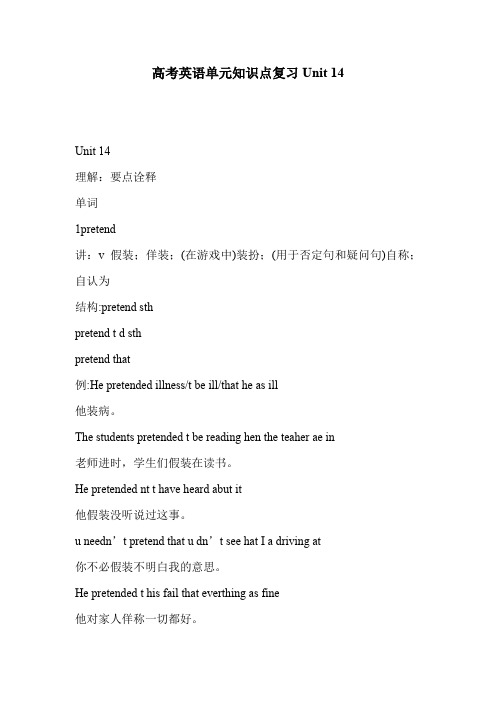
高考英语单元知识点复习Unit 14Unit 14理解:要点诠释单词1pretend讲:v 假装;佯装;(在游戏中)装扮;(用于否定句和疑问句)自称;自认为结构:pretend sthpretend t d sthpretend that例:He pretended illness/t be ill/that he as ill他装病。
The students pretended t be reading hen the teaher ae in老师进时,学生们假装在读书。
He pretended nt t have heard abut it他假装没听说过这事。
u needn’t pretend that u dn’t see hat I a driving at你不必假装不明白我的意思。
He pretended t his fail that everthing as fine他对家人佯称一切都好。
I an’t pretend t an great usial talent我不能妄称自己多有音乐天赋。
I dn’t pretend that I n uh abut the subet,but我不能说自己对这个主题有多了解,但是……链接•提示pretend t 和pretend that一般可以互换,但要注意动词不定式的时态和语态。
练:(2010福建达标中学质量检查) ________t be frightened,the stranger baed t the dr and ran aaAPretending BPretendedT pretend DHaving been pretended提示:本题考查非谓语动词。
动词不定式作状语时常表示目的或结果,此处非谓语动词的逻辑主语应该是主句的主语the stranger,所以用v-ing的主动形式。
答案:A2feth讲:v (去)取(物);(去)带(人);(猎犬)去取回猎物例:He fethed a glbe fr the living r他到起居室拿了地球仪。
九年级英语知识点unit14
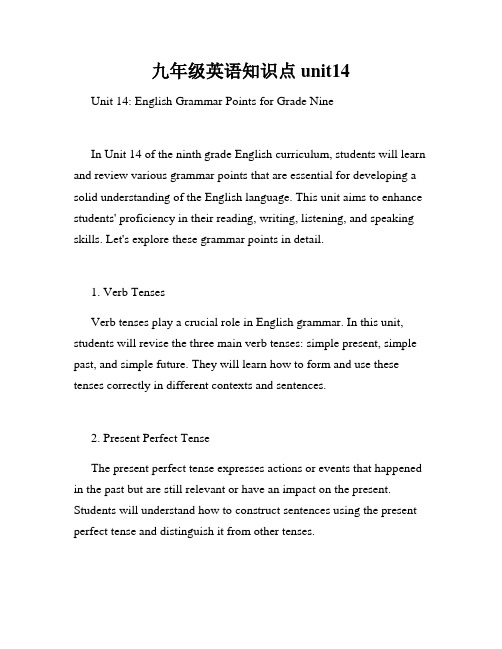
九年级英语知识点unit14Unit 14: English Grammar Points for Grade NineIn Unit 14 of the ninth grade English curriculum, students will learn and review various grammar points that are essential for developing a solid understanding of the English language. This unit aims to enhance students' proficiency in their reading, writing, listening, and speaking skills. Let's explore these grammar points in detail.1. Verb TensesVerb tenses play a crucial role in English grammar. In this unit, students will revise the three main verb tenses: simple present, simple past, and simple future. They will learn how to form and use these tenses correctly in different contexts and sentences.2. Present Perfect TenseThe present perfect tense expresses actions or events that happened in the past but are still relevant or have an impact on the present. Students will understand how to construct sentences using the present perfect tense and distinguish it from other tenses.3. Adverbs of FrequencyAdverbs of frequency describe how often an action occurs. Students will familiarize themselves with common adverbs of frequency such as always, often, sometimes, and never. They will learn how to position these adverbs correctly in a sentence to convey the intended meaning.4. ConditionalsConditionals are important in English as they express hypothetical or imaginary situations and their possible consequences. Students will explore zero, first, second, and third conditionals and understand how to form and use them effectively.5. Reported SpeechReported or indirect speech is used to relay someone else's words or thoughts. Students will learn how to transform direct speech into reported speech accurately while maintaining the intended meaning and tense changes.6. Modal VerbsModal verbs are auxiliary verbs used to express ability, possibility, necessity, permission, and obligation. In this unit, students will revise the modal verbs: can, could, may, might, must, shall, should, will, andwould. They will understand the rules and appropriate usage of each modal verb.7. Passive VoiceThe passive voice is used to emphasize the action or the object being acted upon rather than the subject. Students will learn how to form the passive voice and use it appropriately in different sentence structures.8. Gerunds and InfinitivesGerunds and infinitives function as nouns in sentences and have different uses in English. Students will understand when to use gerunds and infinitives after certain verbs or as the subject or object of a sentence.9. Comparative and Superlative FormsComparative and superlative forms are used to compare two or more things. Students will revise the rules for forming comparative and superlative adjectives and adverbs and practice using them correctly.10. Phrasal VerbsPhrasal verbs consist of a verb and one or more particles. These can drastically change the meaning of the verb. Students will learn commonly used phrasal verbs, their meanings, and how to use them effectively in sentences.In conclusion, Unit 14 focuses on essential grammar points that help students improve their English language skills. By mastering these grammar rules, students will enhance their ability to communicate effectively in both written and spoken English. Regular practice and application of these grammar points will contribute to their overall proficiency in the language.。
九年级英语Unit14知识点
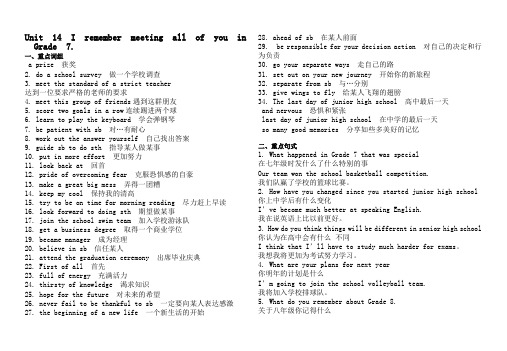
Unit 14 I remember meeting all of you in Grade 7.一、重点词组a prize 获奖2. do a school survey 做一个学校调查3. meet the standard of a strict teacher达到一位要求严格的老师的要求4. meet this group of friends遇到这群朋友5. score two goals in a row连续踢进两个球6. learn to play the keyboard 学会弹钢琴7. be patient with sb 对…有耐心8. work out the answer yourself 自己找出答案9. guide sb to do sth 指导某人做某事10. put in more effort 更加努力11. look back at 回首12. pride of overcoming fear 克服恐惧感的自豪13. make a great big mess 弄得一团糟14. keep my cool 保持我的清高15. try to be on time for morning reading 尽力赶上早读16. look forward to doing sth 期望做某事17. join the school swim team 加入学校游泳队18. get a business degree 取得一个商业学位19. became manager 成为经理20. believe in sb 信任某人21. attend the graduation ceremony 出席毕业庆典22. First of all 首先23. full of energy 充满活力24. thirsty of knowledge 渴求知识25. hope for the future 对未来的希望26. never fail to be thankful to sb 一定要向某人表达感激27. the beginning of a new life 一个新生活的开始28. ahead of sb 在某人前面29. be responsible for your decision action 对自己的决定和行为负责30. go your separate ways 走自己的路31. set out on your new journey 开始你的新旅程32. separate from sb 与…分别33. give wings to fly 给某人飞翔的翅膀34. The last day of junior high school 高中最后一天and nervous 恐惧和紧张last day of junior high school 在中学的最后一天so many good memories 分享如些多美好的记忆二、重点句式1. What happened in Grade 7 that was special在七年级时发什么了什么特别的事Our team won the school basketball competition.我们队赢了学校的篮球比赛。
- 1、下载文档前请自行甄别文档内容的完整性,平台不提供额外的编辑、内容补充、找答案等附加服务。
- 2、"仅部分预览"的文档,不可在线预览部分如存在完整性等问题,可反馈申请退款(可完整预览的文档不适用该条件!)。
- 3、如文档侵犯您的权益,请联系客服反馈,我们会尽快为您处理(人工客服工作时间:9:00-18:30)。
Unit 14 Directions Book ⅠFinding your wayVocabulary1. direction [də'rekʃn] n. 方向,指引the general position a person or thing moves or points towards direction to sw. give directions/ follow the directiondirect v. to tell or show sb. How to get to somewhere or where to godirect sb. to sw.2. feature ['fi:tʃə] n. something important, interesting or typical of a place of thing特色,特征,特点3. petrol [ˈpetrəl] n. a liquid obtained from petroleum, used as fuel in car engines,etc. 汽油(AmE gas/ gasoline)petrol station4. tourist ['tʊərɪst] n. a person who is travelling or visiting a place for pleasure 游客5. corner ['kɔ:nə] n. a part of sth. Where two or more sides, lines, or edges join角落6. square [skweə]adj. having four straight equal sides and four angles of 90n. a shapen. an open area in a town, usually with four sides,surrounded by buildings 广场in the square7. roundabout[ˈraʊndəbaʊt] n. (AmE traffic circle ) a place where two or moreroads meet, forming a circle that all traffic must go round in thesame direction 环岛e.g. At the roundabout, take the second exit.8. crossroads ['krɒsrəʊdz] n. a place where two roads meet and cross each other十字路口at the crossroads9. follow [ˈfɔləu] v. to come or go after or behind s/ sth. 跟随10. across[əˈkrɔs] prep. 横穿过go across the street11.straight [streɪt] adv. not in a curve or at an angle; in a straight line 笔直的,成直线(--straighter--- straightest)adj. without a bend or curve, going in one direction only 直的12. distance ['dɪstəns] n. the amount of space between two places or things 距离,间距 a short/ long distance / the distance to13. yard[jɑ:d] n. 1)(abbr. yd)a unit for measuring length, equal to 3 feet ( 36 inches)or 0.9114 of a metre 码2)an area outside a building, usually with a hard surfaceand surrounding wall 院子14. mile [maɪl]n. a unit for measuring distance equal to 1,609 metres or 1,760 yards英里a 20-mile drive to workWord transformation1. direction n. direct v.2. include v. including prep.3. tourist n. tour n.4. right n. / adj. / adv.Expressions1. on/at the corner (of …)2. at the traffic lights3. in the square4. across the bridge5. go straight ahead6. go/walk along the street7. turn left/right into Maple StreetGrammar祈使句1.(Affirmative) Go straight ahead for about 1 kilometer.2.(Negative) Don’t go straight ahead for about 1 kilometer.3.(Tag question) Go straight ahead for about 1 kilometer, will you ?4.Let’s… , shall we? Let us…, will you?Patterns1.问方位:---Excuse me. Is there a car park near here? ---Yes. There’s one in Duke Street.2. 问路: Excuse me. How do I get to Bridge Street?Could you tell me the way to Bridge Street?I’m looking for Bridge Street. Can you help me?Can you give me the directions to Bridge Street?Can you direct me to Bridge Street?Could you please tell me how I can get to Bridge Street?3. 指路: Go straight ahead. Turn left/right.It’s the third on the right.Go along this road/ across the bridge/ past the bank.4. 问距离:It’s two hours by plane/ two hours’ plane/ a two-hour plane from myhouse to the factory.How far is it from your house to the factory?It’s two hours by car/ two hours’ drive/ a two-hour drive.It’s one hour by bike/ one hour’s ride/ a one-hour ride.It’s two hours on foot/two hours’ walk/ a two-hour walk.Instructions & MapsVocabulary1. instruction [ɪn'strʌkʃn]n. (pl. instructions) detailed information on how to do oruse sth. 指令,用法说明,操作指南(SYN -- directions)e.g. Follow the instructions on the packet carefully. i nstructor 指导者2. sign [saɪn] n. a piece of paper, wood or metal that has writing or a picture on itthat gives you information , instructions, a warning, etc. 标志e.g. Follow the sign for the city centre. 注意sign介词搭配for3. left-hand adj. 左手边的on the left-hand side of …4. profile ['prəʊfaɪl] n. a description of sb./ sth. that gives useful information人物简介5.earn[ɜ:n]v. 赚,获得earn money by doing sth. 注意介词搭配6. land v.to come down through the air onto the ground or another surface 登陆,降落,着陆The plane landed safely.飞机起飞:take offn. the surface of the earth that is not sea 陆地,大地motherland 祖国7.underground 地铁n. go to work by undergroundadj. 地下的underground water 地下水8.need cn. 需求,需要Word transformation1. correct adj./ v. incorrect adj. correctly adv.2. main adj. mainly adv.3. print v. printer n.4. silence n. silent adj.5. need v. need n.Expressions1. the sign for2. No swimming. = Don’t swim.3. the distance to towns and cities in miles4. be/keep silent Silence is gold.5. in silence Everyone sits in silence inside the church.6. earn money by painting earn money by sth./ doing sth.7. write for a newspaper8. marry sb.= be/get married to sb. 完成时态用have/has been married to sb.9. in the 1930s in the eighteenth century in one’s twenties/ thirties…10. return to sw.= come/go back to sw.11. keep the information keep doing/ sb. doing keep sth. adj.12. fall out of13. begin with14. most of15. send sth. to sb.= send sb. sth.16. sell well 此处是sell的主动表被动/ be sold 是被卖17. by underground 通过坐地铁,by 直接加名词中间无冠词18. There is a need for sth.e.g. There is a need for sb. to do sth. = It’s necessary for sb. to do sth.There is no need for sb. to do sth. = It’s unnecessary for sb. to do sth.19. sb. need to do sth.sth need doing./ to be doneGrammar1.no后面加动词的ing形式: 常用名词,名词短语或用NO 加上名词(动词+ing形式);有时也用祈使句。
